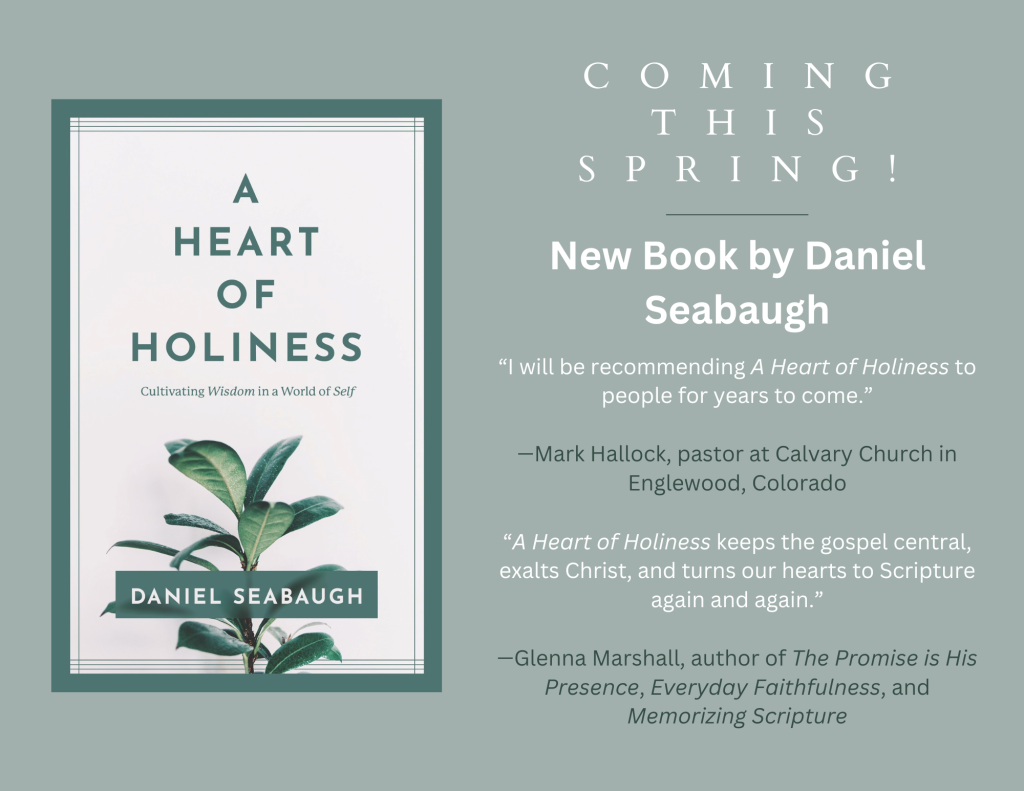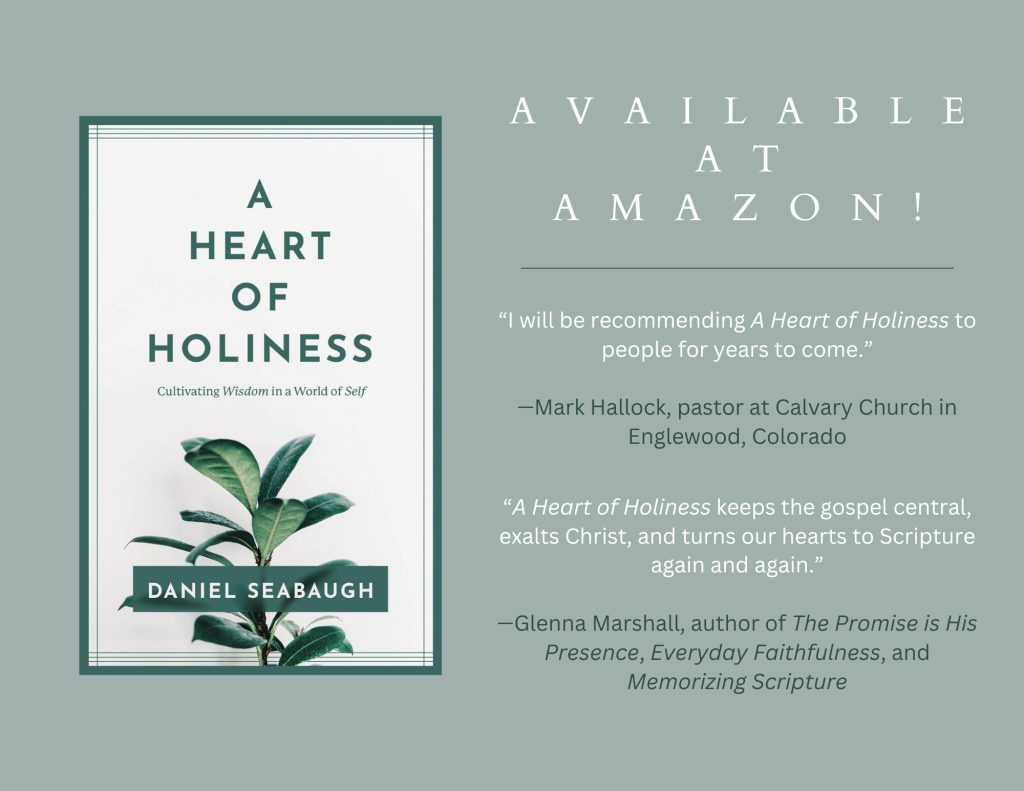Authors note: This is an excerpt from my forthcoming book, A Heart of Holiness: Cultivating Wisdom in a World of Self, which is set to release this spring.
Teach us to number our days, that we may gain a heart of wisdom.
—Psalm 90:12 NIV
It’s easy to live with a skewed sense of time. From gym memberships and plastic surgery to youth obsessions and dietary fads, we fight against our mortality. According to Psalm 90:12, wisdom is found when we acknowledge the brevity of life. It’s a peculiar kind of wisdom, no doubt, but the implication is clear: Numbering our days leads to wisdom.
To number our days means to acknowledge that our time on earth is limited. We will not live forever. We have an expiration date. Instead of recognizing the shortness of life and letting it inform our days, we often behave as if ample time were before us—time for exploring our dreams, expressing ourselves, and seeking pleasures forevermore. In essence, we become me-centric. Our motives scream, “Me first. My happiness. My goals and dreams. My desires. My life.” Our decisions are made without any real reference to God, eternity, or others. We may pay lip service to them, but the motives of our hearts are concerned with gratifying the desires of the flesh (Galatians 5:16). Let me suggest five ways we can grow in wisdom by numbering our days.
First, numbering our days helps us grow in humility. We didn’t ask to come to earth, and we don’t have the ability to stay. Our life is a mist that appears for a little while then vanishes (James 4:14). Life is not about us. We are created beings. Created on purpose for a purpose. Our lives only make sense in reference to the One who created them. If we lose sight of him, we grow in pride, not humility.
Humility is simply the disposition that prepares the soul for living in trust.
—Andrew Murray
Are we trusting in God or self? Is our life marked by the crucified Christ or by self-seeking, self-will, self-confidence, and self-exaltation? Our inevitable deaths should create in us a heart of humility. It’s foolish to think life is about us.
Second, numbering our days will help us prioritize what matters most. Consider how you spend your time. Are you investing in people and sowing seeds for God’s kingdom, or are you exhaustively trying to prove yourself to others? Are you identifying people who need to get in the game and helping them walk in holiness, or are you developing your own spiritual rhythms without any regard for the needs of others?
Our lives are not our own. We were bought with a price—the precious blood of Christ (1 Corinthians 6:19-20). He’s the one who came to serve, not to be served (Mark 10:45). He’s the good shepherd who laid his life down for the sheep (John 10:11). When we follow him without regard for our own lives, he directs our steps and keeps us from fruitless endeavors. He protects his flock from wolves. He guides us toward that which is beautiful and holy, magnificent and God-glorifying. The people in our lives matter more than the things in them. Our work has eternal significance. Our days are spent prioritizing what matters most.
Third, numbering our days produces gratitude in our hearts for life’s simple pleasures. Joy exists in this world. For me, sunsets, a good cup of coffee, mountain vacations, friendships, a fantasy novel, and bicycle rides bring a smile to my face. We engage in these things differently, however, depending on our beliefs about life. If we believe this life is all there is and nothing afterwards, our affections attach to things made in a store, as it were. When the true nature of worldliness is revealed, whether through death or dying, our joy is pulled from under us, and we become discouraged, or worse, depressed. Apart from Christ, life as we know it loses its appeal. Everything we believe about the world becomes disordered. We feel disoriented and confused. In many cases, we grow angry and distance ourselves from the people closest to us.
It’s a little ironic, really. Because we assume our days will last forever, life’s simple pleasures are taken for granted, such as walking, breathing, hearing, seeing, working, dreaming, creativity, and traveling with ease. Life is all around us, but we miss it because we don’t realize how fleeting it is. Life’s pleasures are not guaranteed (just ask your grandparents), but they certainly feel like they are when we’re young.
Fourth, numbering our days helps us store up treasure in heaven. Jesus was a masterful teacher. The best teacher to ever live. During his famous sermon on the mount, he shared these words with his followers:
Don’t store up for yourselves treasures on earth, where moth and rust destroy and where thieves break in and steal. But store up for yourselves treasures in heaven, where neither moth nor rust destroys, and where thieves don’t break in and steal. For where your treasure is, there your heart will be also.
—Matthew 6:19-21 CSB
Jesus is not just sharing good advice. He’s teaching his followers a very important lesson: Our attention is given to the things we value most. If our treasure is found in this world, we’ll miss out on what Jesus wants to do most in us and through us, namely, make us like himself—people who walk in humility, grace, and, ultimately, holiness forever. If our hobbies are most important to us, worshiping with God’s people on Sunday morning will take a back seat. If binge-watching the latest season of our favorite show is most important to us, spending time in God’s Word will fall to the wayside.
Lastly, numbering our days helps us worship the one who defeated death. Jesus is worthy of our adoration for many wonderful, awe-inspiring reasons, not least of which is his conquering of death, by which we too, in our eventual deaths, find life through resurrection. Such life is given to anyone who places faith in Jesus. Words cannot express how marvelous this truth is. We can and must worship Jesus because he paid it all.
Yes, though it may be unusual considering the world and its ways, learning to number our days will produce in us a heart of holiness. We will grow in humility, have better priorities, enjoy more of life’s simple pleasures, store up treasure in heaven, and worship in ways fitting for a redeemed child of God.

What People Are Saying
In the late ‘70s, holiness became a hot topic. Preachers were preaching about it, and writers were writing about it. Then it seems the church moved on. But should we ever move on from something so central to the nature of God? I thank God that Daniel Seabaugh has gone countercultural on us. He tells us things every Christian should know—important, foundational material. My hope for the readers of this book is that holiness becomes core to their Christian identity and takes greater prominence in their lives as they join the unending hymn before the throne, “Holy, holy, holy is the Lord God, Almighty!”
Ron Watts, senior and founding pastor at La Croix Church in Cape Girardeau, Missouri
What does it mean to live a holy life? Daniel Seabaugh has given us a wholistic primer on the Christian life. Accessible to believers of all ages and stages, A Heart of Holiness keeps the gospel central, exalts Christ, and turns our hearts to Scripture again and again.
Glenna Marshall, author of The Promise is His Presence, Everyday Faithfulness, and Memorizing Scripture







Leave a comment